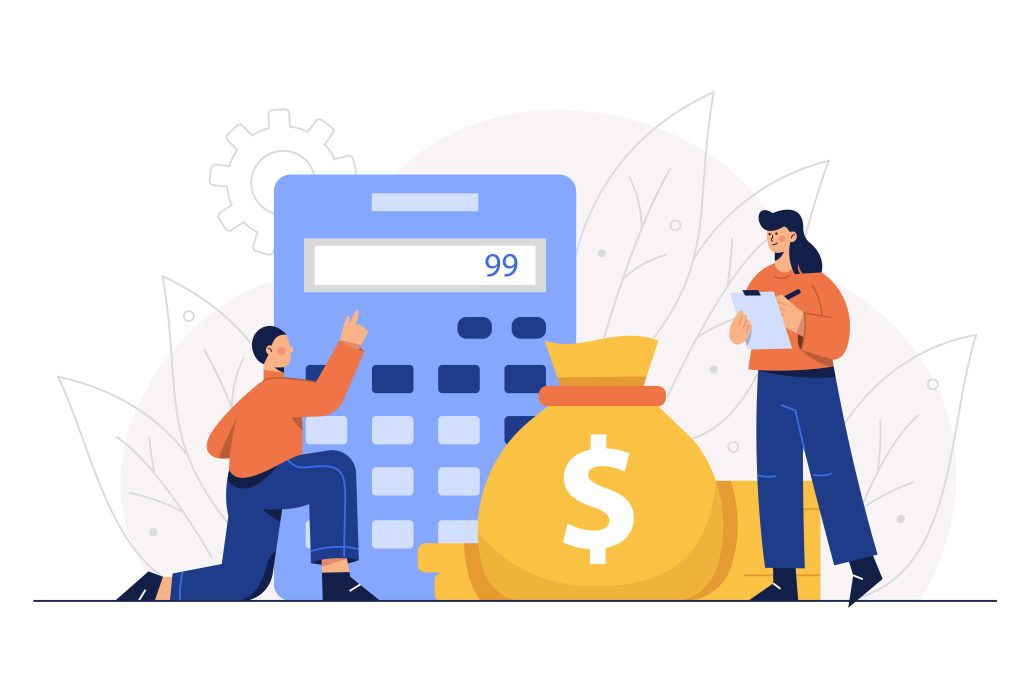Affiliate marketing is one of the most effective strategies for driving sales and expanding brand reach. However, many businesses overlook the hidden costs of running an affiliate program. This post will help you understand affiliate marketing costs, which ensure program’s high ROI rate.
Let’s break down the key costs involved in affiliate marketing!

What is affiliate marketing?
Affiliate marketing is a performance-based marketing model in which businesses, also known as merchants, partner with affiliates to promote their products or services. In exchange for driving traffic, leads, or sales through the affiliate’s marketing efforts, affiliates earn a commission. This model is beneficial for both merchants and affiliates, as merchants only pay when a specific action (like a sale) is completed, and affiliates can generate revenue by promoting products or services.
How to budget an Affiliate Program?
When launching and maintaining an affiliate program, several costs must be considered. Understanding these costs is essential to properly budgeting for an affiliate program and ensuring that the program remains profitable.
- Start-up fees: Start-up fees are one-time expenses incurred when setting up your affiliate program like software set-up, network sign-up, etc
- Recurring fees: They are ongoing costs associated with the continuous operation of your affiliate program such as subscriptions, fees, commission, etc. This includes the costs for affiliate software, affiliate recruitment, program promotion, marketing materials & other affiliate management side tasks.
- Affiliate commission: Affiliate commission is the core cost of an affiliate program, as it is the payment made to affiliates for driving sales, leads, or traffic. The structure of affiliate commissions can vary depending on the program and the agreement between the merchant and affiliate.
- Non-recurring expense: It is unexpected cost that you need sometime to improve your program. For example, re-design the affiliate portal. This takes around 10% of the affiliate marketing cost in your plan.
Your affiliate program monthly expense report may look like this:

Breakdown of Affiliate Marketing Cost
Affiliate marketing costs can vary widely depending on the structure of your program, the size of your business, and the tools you use. To help you understand where your money goes, let’s break down each key cost area in more detail
Affiliate commission
Affiliate commission is the primary cost in any affiliate program and can be broken down into different categories:
- Commission per sale (CPS): This is the standard commission paid to affiliates for every sale they generate. It’s usually a percentage of the sale amount, ranging from 5% to 30% or more, depending on your industry and pricing model.
- Recurring commission: For businesses offering subscription-based products or services, you may offer recurring commissions to affiliates for each payment a customer makes after the initial sale. This can be a powerful incentive for affiliates and helps to maintain long-term partnerships.
- Incentives and bonuses: Some programs offer bonuses for high-performing affiliates or for affiliates who reach specific targets. For example, affiliates who generate 100 sales in a month might receive a one-time bonus or a higher commission percentage for the following month. This encourages affiliates to work harder and promote your products more effectively.
Affiliate software
Affiliate software is a critical tool for tracking sales, managing affiliates, and ensuring the smooth running of your affiliate program. The costs associated with affiliate software include:
- Subscription fees: Affiliate management platforms like Refersion, ShareASale, or Impact charge monthly or annual fees for access to their tools. Prices can vary from $50 to $500 or more per month, depending on the size of your program and the features offered.
- Additional tools: If you need advanced features like detailed analytics, custom reporting, or automated affiliate communications, there may be additional charges for these tools. For example, you might pay extra for advanced fraud detection, multi-currency payment processing, or higher-tier reporting capabilities.
- Payment processing fees: Most affiliate software platforms integrate with third-party payment processors like PayPal or bank transfers to pay affiliates. These processors charge a transaction fee, typically around 2-3% per payment. For example, if you’re paying an affiliate $100, the payment processor might charge you $2-$3 in fees.
- Commission Fee: Platform or software will take a commission fee. Commission fee is a part of the order value made via affiliate links. The amount typically stay under 5%, but some affiliate software take none.
| Platform | Example | Initial Cost | Recurring Costs (SME only) | Commission Fees | Notes |
| Shopify | BixGrow, GoAffPro, Referral Candy | No | $15/month to $100/month | Typically no commission is taken by Shopify, but some apps may take a small % (less than 5%) of sales | You can use these apps with limited functionality (for FREE), unless using custom-built solutions |
| WooCommerce | AffiliateWP, YITH WooCommerce Affiliates, WP Affiliate Manager | $0 to $200 (one-time) | $10/month to $50/month | No commission is taken by the platform | Can use basic plugins for free or low cost, but more advanced plugins are better for scaling |
| Independent Networks | Impact, ShareASale, CJ Affiliate | No | $0 to $500/month | Network commission (usually 10-20% of revenue) | These platforms provide affiliate network infrastructure, but they take a percentage of affiliate sales. |
| BigCommerce | Refersion, LeadDyno, GoAffPro | No | $50/month to $300/month | No commission is taken, but fees for specific actions may apply | Offers integrated affiliate solutions, with more flexibility at higher tiers. |
| Magento | MageComp Affiliate, Affiliate Pro, Webkul Affiliate | $99/month to $399 (one-time) | $20/month to $100/month | No commission is taken, but some apps charge setup fees | Customizable for businesses with a large number of affiliates and complex needs. |
| Squarespace | Affiliate Marketing by Elfsight, Omnistar, Refersion | No | $15/month to $100/month | Typically no commission is taken by platforms, but may charge for certain features | Limited functionality on Squarespace; better for smaller businesses with fewer affiliates. |
Affiliate Recruitment & Program Promotion

To attract affiliates to your program and ensure it is running successfully, you’ll need to invest in recruitment and promotional efforts. Here are the cost breakdown:
- Recruitment costs: If you hire an agency or use an affiliate network to help recruit affiliates, you will incur costs for their services. These could be a one-time fee or a percentage of affiliate commissions. This cost varies. For example, an in-house marketing executive cost you $0, a Fiverr freelance cost you less than $100 and a marketing agency can cost you around ~$1,000.
- Program advertising: To ensure affiliates are aware of your program, you’ll need to promote it. This can involve advertising on affiliate networks, paid social media ads, email campaigns, or sponsoring affiliate marketing events.
- Influencer marketing: If you’re targeting influencers to join your affiliate program, you may need to provide additional incentives, like free products, sponsorships, or higher commissions for larger influencers. These additional costs can add up to around $5,000 per post/video for a mid-sized influencers.
Marketing materials
To support your affiliates in promoting your products or services, you’ll need to provide them with marketing materials. These costs typically include:
- Creative assets: These are the images, banners, videos, and other promotional materials affiliates will use on their websites or social media. Depending on the quality of the assets, the cost of producing them can vary. Hiring professional graphic designers or photographers could add $1,000 or more to your marketing budget.
- Landing pages: If you choose to provide affiliates with custom landing pages to drive traffic, this could incur additional costs for design and development. Some programs use third-party tools to create landing pages (free), while others use an in-house web development team to build them (free). Outsource does not cost much, may be around $200 if you hire a developer on Fiverr.
- Copywriting: High-quality promotional copy is key for affiliates to convert leads into sales. You may need to hire copywriters to create email templates, ad copy, and blog posts. Costs for freelance copywriters can range from $50 to $200 per piece of content.
Affiliate Management
Finally, managing your affiliate program is an ongoing cost that may includes:
- Affiliate manager: If your program grows large, you may need to hire an affiliate manager or a team to oversee the operations, communicate with affiliates, and ensure smooth payouts. Salaries for affiliate managers typically range from $40,000 to $70,000 annually, depending on experience and location.
- Optimization & Support: Costs for continually optimizing your affiliate program and providing ongoing support for your affiliates. This may include A/B testing landing pages, adjusting commission rates, or providing technical support to help affiliates troubleshoot tracking issues.
- Ongoing commission adjustments: As your program evolves, you may need to make adjustments to the commission structure or incentives to stay competitive. For example, increasing the commission rate for top performers or adding new performance bonuses can drive further sales.
Whether you’re just starting out or scaling your program, it’s important to track and manage these costs carefully for sustained success.
Cost for a Affiliate Marketing Agency

There are some brand may choose to work with affiliate marketing agency. This is exceptionally suitable for whom preferring hassle-free approach.
In this model, an affiliate marketing agency will manage your affiliate program. This includes recruiting affiliates, developing strategies, creating marketing materials, and tracking performance. Agencies often have the expertise and resources to handle all aspects of affiliate marketing. However, the cost for an affiliate marketing agency is high, which range from $1,000 to $10,000 monthly & they may takes a percentage of the affiliate commissions.
Cost for an In-house Affiliate Marketing Program
It means that the business owner is responsible for all tasks in affiliate management, including recruiting affiliates, managing software, creating promotional materials, and tracking affiliate performance. As you can minimize expense, the cost is much more flexible and can be as low as $200 per month. It could reach $5,000 per month for a mid to big brands.
This approach offers more control over your affiliate relationships but requires more time, resources, and expertise. Many businesses opt for self-hosting when they want to offer high affiliate commission or have specific requirements for managing their affiliate program. You will need to use an affiliate software or affiliate networks to manage an affiliate program yourself.
The points is working with an affiliate marketing agency is much more expensive than running an in-house program (in terms of cash spent, not time & human resources). So, many SMEs prefer to use affiliate marketing software due to theirs financial status.
Affiliate marketing budget for different business sizes
When it comes to setting up and maintaining an affiliate marketing program, the amount you spend will largely depend on the size and scope of your business. Smaller businesses or startups will have different budget constraints compared to larger, established companies.
Small businesses & Startups
For small businesses, keeping affiliate marketing costs manageable is key. Here’s a simplified approach:
- Affiliate Commission: Offer a competitive 5% to 20% commission per sale. For subscription services, consider recurring commissions to encourage long-term affiliate involvement.
- Affiliate Software: Start with budget-friendly options like BixGrow or LeadDyno, priced between $15 and $100 per month, to manage affiliates without high costs.
- Recruitment & Promotion: Use zero-cost promotion or low-cost methods like reaching out to bloggers, micro-influencers, and program directory listing. Social media and forums are also useful for promoting your program.
- Marketing Materials: Use DIY tools like Canva for creating promotional materials. If budget allows, hire freelance designers for professional designs, ranging from $50 to $200 per piece.
- Affiliate Management: Initially, manage the program yourself. You can consider hiring an affiliate manager once the program grows.
Small businesses can expect to spend between $200 to $500 per month on affiliate marketing, especially when starting with modest affiliate recruitment and basic tools.

Medium-sized businesses
For medium-sized businesses, the affiliate marketing budget grows, allowing for better tools and recruitment efforts. Here’s an overview:
- Affiliate Commission: Offer 1% to 20% commission, depending on the product and competition, to attract affiliates with strong traffic.
- Affiliate Software: Use platforms like BixGrow, Awin, or ShareASale, which cost between $15 and $500 per month, offering advanced analytics and reporting.
- Recruitment & Promotion: With a larger budget, invest in affiliate recruitment campaigns, influencer partnerships, or agencies. This could range from $500 to $2,000 per month, depending on scale.
- Marketing Materials: Allocate $500 to $1,000 for high-quality banners, videos, and promotional assets to strengthen affiliate relationships.
- Affiliate Management: Hire a part-time affiliate manager for $30,000 to $45,000 annually or outsource to an agency for $2,000 to $5,000 per month.
Expect the monthly cost for medium-sized businesses to be around $1,000 to $10,000, depending on the level of automation, recruitment, and affiliate management you require.
Large businesses & Enterprises
For large businesses or enterprises, affiliate marketing becomes a core part of the strategy, with a significant budget and infrastructure. Here’s a breakdown:
- Affiliate Commission: Typically offer less than 10% commission, with additional incentives like bonuses or tiered commissions to motivate affiliates, especially for high-ticket or subscription-based products.
- Affiliate Software: Use enterprise-level platforms like BixGrow, or Rakuten Marketing, costing $50 to $2,000 per month or more. These platforms provide advanced features like multi-currency support and CRM integration.
- Recruitment & Promotion: Budget $5,000 (or more) per month for affiliate recruitment and program promotion, targeting top-tier affiliates through agencies and influencer partnerships.
- Marketing Materials: Invest $2,000 to $10,000 per month in high-quality creatives like videos, social media campaigns, and print materials for affiliates.
- Affiliate Management: Hire full-time affiliate managers with salaries ranging from $50,000 to $120,000 annually or outsource to an agency for $5,000 to $25,000 per month to manage recruitment and optimization.
Large businesses can expect to spend $5,000+ or more per month depending on the size of their affiliate marketing operations.
Smaller businesses can start with a modest budget (or even $0) and scale as the program grows, while medium-sized and large businesses should be prepared for higher upfront investments in software, recruitment, and management. However, from my experience, the affiliate marketing costs for big & mid brand might be versatile. There are a lot of way to launch an affiliate program economically.
Conclusion
Affiliate marketing can be a highly effective and scalable strategy for driving revenue, but it’s essential to understand and manage the associated costs. Whether you’re a small business just starting or an enterprise-level organization with a well-established program, affiliate marketing expenses vary depending on the size and complexity of your efforts. From affiliate commissions and software costs to recruitment, marketing materials, and ongoing management, each element contributes to the overall budget.
By carefully considering these costs and budgeting according to your business size, you can ensure that your affiliate marketing program is both sustainable and profitable. With the right approach, affiliate marketing can offer impressive returns and drive growth across a variety of industries.